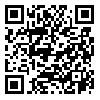Volume 15, Issue 2 (Paramedical Sciences and Military Health (Summer 2020) 2020)
Paramedical Sciences and Military Health 2020, 15(2): 10-18 |
Back to browse issues page
1- Department of Educational Psychology, Islamic Azad University, Birjand branch, Birjand, Iran
2- Department of Clinical Psychology, Faculty of Medicine, AJA University of medical sciences, Tehran, Iran ,f.r.moeeni86@gmail.com
3- Department of Clinical Psychology, Faculty of Medicine, AJA University of medical sciences, Tehran, Iran
4- Department of Psychology, Bahar Institute of Higher Education, Mashhad, Iran
2- Department of Clinical Psychology, Faculty of Medicine, AJA University of medical sciences, Tehran, Iran ,
3- Department of Clinical Psychology, Faculty of Medicine, AJA University of medical sciences, Tehran, Iran
4- Department of Psychology, Bahar Institute of Higher Education, Mashhad, Iran
Abstract: (2961 Views)
Introduction: Obsessive-compulsive disorder is a chronic anxiety disorder that characterized by excessive preoccupation about orderliness and minor disputes and doubts. The current study aimed to survey the effectiveness of cognitive analytic therapy on reducing guilt fleeing and doubt in people with obsessive-compulsive disorder.
Methods and Materials: For this purpose, among the people with this disorder who referred to psychiatric and psychological clinics in Mashhad, 24 people were selected voluntarily and they were randomly assigned in to two experimental and control groups. The experimental group received cognitive analytic therapy in 9 sessions of 1.5 hours and the control group did not receive any intervention. The dependent variables were measured twice in pretest and posttest. The guilt fleeing Scale and Maudsley Obsessive Compulsive Inventory were used to measure the variables.
Results: Data analysis using univariate and multivariate analysis of covariance showed that cognitive analytical therapy effectively reduced guilt fleeing and doubt in the experimental group compared to the control group by controlling the effects of pretest.
Discussion and Conclusion: The present study shows that cognitive analytic therapy persuades clients to change and achieve more constructive methods and guide their thoughts by providing knowledge about cognitive errors and the nature of the symptoms of obsessivecompulsive
disorder.
Methods and Materials: For this purpose, among the people with this disorder who referred to psychiatric and psychological clinics in Mashhad, 24 people were selected voluntarily and they were randomly assigned in to two experimental and control groups. The experimental group received cognitive analytic therapy in 9 sessions of 1.5 hours and the control group did not receive any intervention. The dependent variables were measured twice in pretest and posttest. The guilt fleeing Scale and Maudsley Obsessive Compulsive Inventory were used to measure the variables.
Results: Data analysis using univariate and multivariate analysis of covariance showed that cognitive analytical therapy effectively reduced guilt fleeing and doubt in the experimental group compared to the control group by controlling the effects of pretest.
Discussion and Conclusion: The present study shows that cognitive analytic therapy persuades clients to change and achieve more constructive methods and guide their thoughts by providing knowledge about cognitive errors and the nature of the symptoms of obsessivecompulsive
disorder.
Type of Study: Research |
Subject:
full articles
Received: 2020/07/15 | Accepted: 2020/09/15 | Published: 2020/09/21
Received: 2020/07/15 | Accepted: 2020/09/15 | Published: 2020/09/21
| Rights and permissions | |
 |
This work is licensed under a Creative Commons Attribution-NonCommercial 4.0 International License. |


